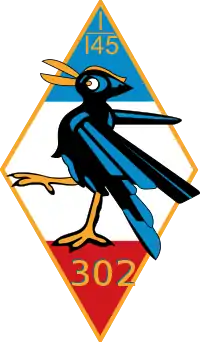| No. 302 (City of Poznan) Polish Fighter Squadron | |
|---|---|
 | |
| Active | 10 July 1940 – 18 December 1946 |
| Country | |
| Allegiance | |
| Branch | |
| Role | Fighter and escort |
| Part of | RAF Fighter Command |
| Nickname(s) | Poznan
Dywizjon Myśliwski "Poznański" |
| Aircraft | Hawker Hurricane Supermarine Spitfire |
| Engagements | Battle of Britain Operation Jubilee Bomber escort Battle of Normandy Crossing the Rhine |
| Commanders | |
| Notable commanders | Piotr Łaguna, Wacław Król |
| Insignia | |
| Squadron Codes | WX (1940 - Jan 1945) QH (Jan 1945 - Dec 1946) |
No. 302 (City of Poznan) Polish Fighter Squadron RAF (Polish: 302 Dywizjon Myśliwski "Poznański") was a Polish fighter squadron formed in Great Britain as part of an agreement between the Polish Government in Exile and the United Kingdom in 1940. It was one of several Polish fighter squadrons fighting alongside the Royal Air Force during World War II.
History
The squadron inherited the traditions, along with the emblem and a large part of the initial crew, of the pre-war Polish III/3 Fighter Squadron composed of the 131st and 132nd Fighter Escadrilles.
The Squadron was one of the four Polish-cored Royal Air Force squadrons that participated in the Battle of Britain. It consisted mostly of Polish pilots, many of whom were veterans. The backbone of the squadron was formed by 13 pilots who served with the I/145 Polish Fighter Squadron and were evacuated from France during the last stages of the German invasion of France.
The squadron was formed on 10 July 1940, equipped with Hawker Hurricanes the squadron was part of No. 12 Group RAF. As the combat became more fierce, the 302 was moved to RAF Duxford, north of London. The squadron operated from there as part of the Duxford Wing, 12 Group's 'Big Wing' formation, from 14 September through 25 September. Having enjoyed some success on East Coast patrols following the Battle of Britiain, No. 302 Squadron re-located to RAF Jurby, Isle of Man, where they commenced night flying training and low level work. At some point afterwards the squadron operated from Chailey. On 11 June 1944, 302 became the first Polish Squadron to land in France, five days after D-Day. It was fighting as part of No. 131 Polish Fighter Wing when its airfield was attacked by Jagdgeschwader 1 during Operation Bodenplatte in January 1945.
No. 302 Polish Squadron lost 20 pilots killed, 12 missing and 9 taken prisoners, 63 aircraft destroyed and 43 damaged by the enemy's air defence.
It was disbanded on 18 December 1946,[1][2] at RAF Hethel.[3] A replica Hurricane in 302 squadron markings was the gate guardian at the Imperial War Museum Duxford until it was repainted in 242 squadron markings in Feb 2018.[4]
Commanders
- overall general command (British) 13 July 1940 - Squadron Leader William A. J. Satchell
- 1 January 1941 S/Ldr (kpt.) Piotr Łaguna
- 13 July 1940 - S/Ldr (mjr) Mieczysław Mümler
- 7 December 1940 - S/Ldr (kpt.) Piotr Łaguna
- 19 May 1941 - F/Lt (kpt.) (15 June 1941 - Acting S/Ldr) Stefan Witorzeńć
- 28 November 1941 - S/Ldr (kpt.) Julian Kowalski
- 25 August 1942 - S/Ldr (kpt.) Stanisław Łapka
- 16 May 1943 - S/Ldr (kpt.) Wieczysław Barański
- 18 October 1943 - S/Ldr (kpt.) Wacław Król
- 7 July 1944 - S/Ldr (kpt.) Marian Duryasz
- 30 January 1945 - S/Ldr (kpt.) Zygmunt Bieńkowski
- 24 February 1945 - S/Ldr (kpt.) Ignacy Olszewski
- 24 March 1945 - S/Ldr (kpt.) Bolesław Kaczmarek
- 1 August 1945 - S/Ldr (kpt.) Jerzy Szymankiewicz (until disbanding)
Aircraft operated
| From | To | Aircraft | Version |
|---|---|---|---|
| July 1940 | March 1941 | Hawker Hurricane | Mk.I |
| March 1941 | May 1941 | Hawker Hurricane | Mk.IIa |
| May 1941 | July 1941 | Hawker Hurricane | Mk.I |
| July 1941 | October 1941 | Hawker Hurricane | Mk.IIb |
| October 1941 | September 1943 | Supermarine Spitfire | Mks.Vb, Vc |
| September 1943 | February 1945 | Supermarine Spitfire | Mk.IX |
| February 1945 | December 1946 | Supermarine Spitfire | Mk.XVI |
See also
References
Notes
Bibliography
- Cynk, Jerzy B. The Polish Air Force at War: The Official History, 1939-1943. Atglen, PA: Schiffer Publishing, 1998. ISBN 0-7643-0559-X.
- Cynk, Jerzy B. The Polish Air Force at War: The Official History, 1943-1945. Atglen, PA: Schiffer Publishing, 1998. ISBN 0-7643-0560-3.
- Gretzyngier, Robert. Poles in Defence of Britain: A Day-by-Day Chronology of Polish Day and Night Fighter Operations, July 1940 - June 1941. London: Grub Street, 2001. ISBN 1-902304-54-3.
- Gretzyngier, Robert. Polskie Skrzydła 4: Hawker Hurricane, część 1 (in Polish). Sandomierz, Poland: Stratus, 2005. ISBN 83-89450-37-2.
- Halley, James J. The Squadrons of the Royal Air Force & Commonwealth, 1918 -1988. Tonbridge, Kent, UK: Air Britain (Historians) Ltd., 1988. ISBN 0-85130-164-9.
- Jefford, C.G. RAF Squadrons, A Comprehensive Record of the Movement and Equipment of all RAF Squadrons and their Antecedents since 1912. Shrewsbury, UK: Airlife Publishing, 1998 (Second edition 2001). ISBN 978-1-84037-141-3.
- Lisiewcz, M. et al. Destiny Can Wait: The Polish Air Force in the Second World War. Nashville, Tennessee: Battery Press, 1988. ISBN 0-89839-113-X.
- Rawlings, John D.R. Fighter Squadrons of the RAF and their Aircraft. London: Macdonald and Jane's (Publishers) Ltd., 1969 (new edition 1976, reprinted 1978). ISBN 0-354-01028-X.
- Zamoyski, Adam. The Forgotten Few: The Polish Air Force in the Second World War. New York: Hippocrene Books Inc., 1995. ISBN 978-0-7818-0421-9.